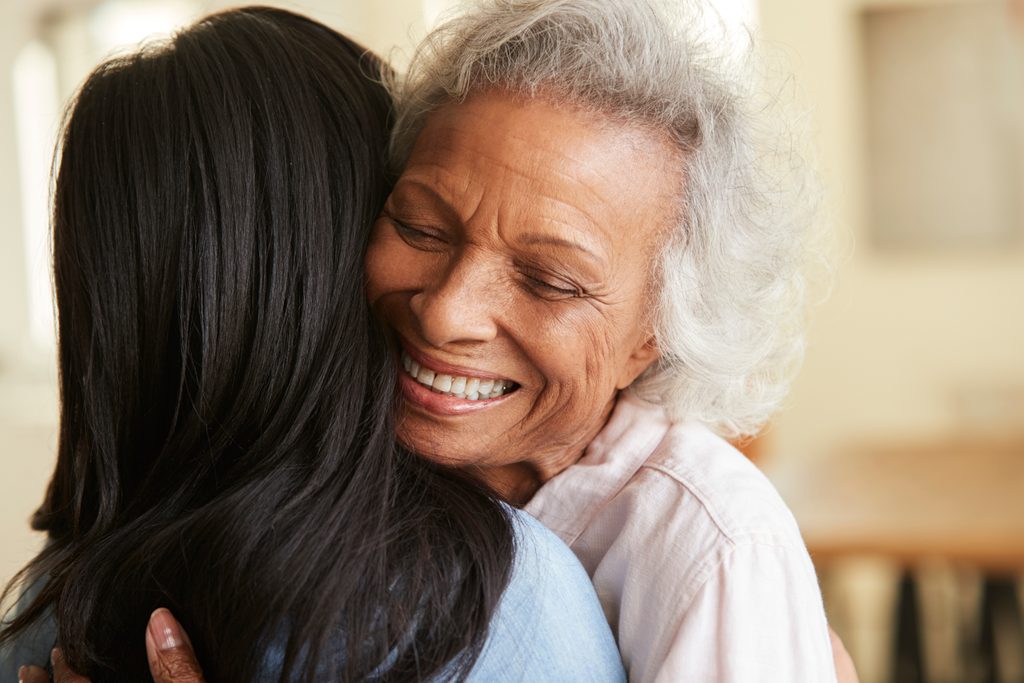Here’s What Happens to Your Body When You Get a Hug
Updated: Nov. 12, 2020

These are the surprising health benefits of hugging, from being less stressed to a better sex life.
Our editors and experts handpick every product we feature. We may earn a commission from your purchases.
Forget an apple a day: Getting hugs regularly, on a daily basis, may be one of the best ways to help you stay healthy. And if you don’t have a hugger on hand, other types of skin touch or movement may also do the trick.
“The benefits of moving the skin—as in massage, hugging, cuddling, doing yoga, fast walking, brushing yourself in the shower—boost physical, mental and emotional health as evidenced by reduced pain, anxiety, and depression,” explains Tiffany Field, PhD, director of the Touch Research Institute in the department of pediatrics at the University of Miami School of Medicine.
The wellness boost from physical connections is so intricate, in fact, that it has been the basis of Field’s career and an ongoing source of personal interest. She conducts research, which is funded by National Institutes of Health, March of Dimes, and several companies, on the effects of alternative therapies like massage therapy on medical and psychological conditions. Fields and her Touch Research Institute team have conducted more than 100 studies on hugs, hand-holding, massage therapy, and yoga in both healthy people and those with medical and psychiatric conditions.
Here’s what they’ve discovered about how your body responds to getting a hug.
Your nervous system chills out
Essentially, that arms-around pressure (or even a hand caress) signals to your brain to stress less. “As the skin is moved, the stimulation of pressure receptors under the skin increases vagal activity,” Fields says. This activity of the vagus, a cranial nerve that has branches to several parts of the body, leads to a more relaxed nervous system.
You’ll assist your immunity
A nervous system that’s in a more zen state, including a lower heart rate and a more relaxed brain wave pattern, may help you lessen the impact of a cold. A 2014 study in Psychological Science found social support, in the form of hugging, led to less severe cold virus symptoms among those who initially felt stress due to interpersonal conflict. Hugging seemed to provide a buffer effect between the stress related to conflict and susceptibility to a respiratory infection. “Stress hormones, including cortisol, are decreased and thereby natural killer cells are increased,” Field says. “These kill bacteria, viruses, and even cancer cells.”
You may sleep better
You fall asleep in the same bed, but do you touch? A whopping 63 percent of Americans sleep on separate sides of the mattress, according to research by the National Sleep Foundation (NSF). That’s fine, especially if you need to breathing room to rest well. However, try to sneak in a small cuddle session before you fall asleep. Just 10 minutes of touching can help you sleep more soundly, the NSF says.
A little touch time during the day can improve your sleep and sensory experiences, too.
“Many people get massaged and practice yoga because of pain,” Field says. “We have found that practices that involve moving the skin lead to more deep and restorative sleep which leads to pain reduction because less substance P—a neurotransmitter involved in the feelings of pain—is produced.”
Happy hormones may course throughout the body
“The biochemical effects of touch include increased serotonin—the body’s natural antidepressant and anti-pain neurotransmitter—and increased oxytocin—the love hormone,” Field says.
There’s good news for couples too: Higher levels of oxytocin are associated with greater perceptions of a partner’s responsiveness and gratitude, as well as greater experienced love, according to a 2017 study published in the journal Psychological Science. Oxytocin, which is known to be important in bonding between mother and child, can play a role in adult human bonding, too.
Also, for people who have been in an argument, hugging may help soothe tension or at least the chances that it will affect your mood. In a 2018 study in more than 400 adults published in PLoS One, people were more likely to feel depressed or bad on days they experienced conflict (as you might expect). However, hugs seemed to help reduce the chances that a conflict would cause a negative impact on mood. That seemed to be true for both men and women and it didn’t seem to make a difference if a person was married, in a relationship, or single.
The hugger may get a mood boost as well
“The benefits for the person giving touch can be even greater than the person receiving it,” says Aline Zoldbrod, PhD, a licensed psychologist and sex therapist in Boston and the author of SexSmart: How Your Childhood Shaped Your Sexual Life and What to Do About It.
But only if you like each other.
“Our bodies, which are programmed to like touch, do not enjoy being touched by people we don’t like, or people we are scared of,” Zoldbrod adds.
 It’s a way to express your love language
It’s a way to express your love language
Physical touch is one of The Five Love Languages that author Gary Chapman says fosters connection. (The others are gifts, acts of service, quality time, and words of affirmation.) If this direct way to communicate that you care is one of yours—or your partner’s—top languages, it can keep you in sync even when you don’t feel like talking.
“Consistent, good experiences with loving touch helps you to make crucial links which you need. You need to be able to link love with touch, and touch with safety,” Zoldbrod says.
You’ll have a better sex life
It’s not just during sex that you’ll feel connected to your partner. As your heart and hormones are racing after sex, it’s still “prime time” for intimate bonding. In a 2014 study published in Archives of Sexual Behavior, longer cuddle times after sex were correlated to higher sexual—and relationship—satisfaction. This effect is true for both genders, but is especially strong for women.
And the health benefits can extend for decades
More affection during childhood leads to a healthier, longer life, according to a 2013 study in the journal Proceedings of the National Academy of Sciences. Kids who said they had lower amounts of affection and love—say, fewer hugs and “I love yous”—were more at-risk for heart disease in adulthood. So if you have a family, and it feels right for you, share a hug or hold hands with the ones you love.
So how much touch is enough?
The more the better … as long as you both enjoy the act of touching (and enjoy each other, per Zoldbrod’s previous advice), according to Field’s data. As couples’ touch rates increase, their happiness and healthiness appears to improve even more.
